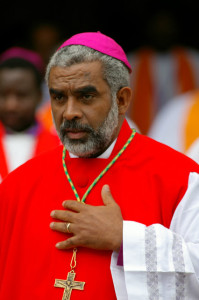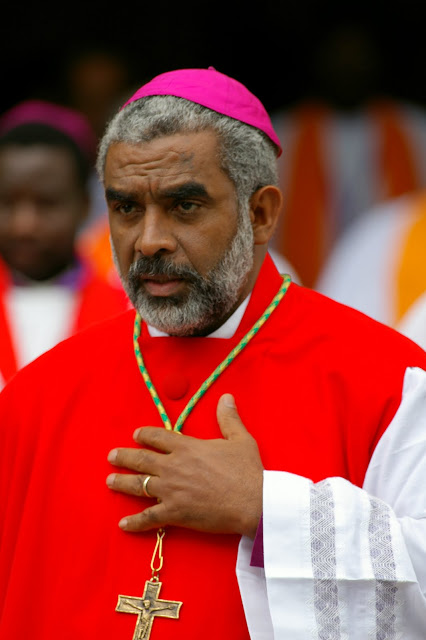SUFFRAGAN BISHOP, KINGSTON
AT THE SYNOD EUCHARIST, Thursday, April 24, 2014
Sermon text: Luke 24: 38-39, 46-48

“Jesus said to them, why are you frightened, and why do doubts arise in your
hearts? Look at my hands and my feet; see that it is I myself. Touch me and see;
…And He said to them, ‘Thus it is written, that the Messiah is to suffer and to rise
from the dead on the third day, and that repentance and forgiveness of sins is to
be proclaimed in his name to all nations beginning from Jerusalem. You are
witnesses of these things.”
One of the most peculiar things about Luke’s Resurrection story is the way Jesus
identifies himself to his friends. “Look at my feet”, he says to his frightened, doubtful and
despairing disciples. Jesus wanted them to see the wounds and it was important for the
disciples to look, because they had never wanted to do this before. They ran away from
facing up to the real cost of discipleship.
Some two thousand years after the disciples were challenged to look at the wounded
body of Christ and after 350 years of Anglican witness in Jamaica, we too are called to
look at the wounds on the Body of Christ – his Church. Yes – we must look at the wounds;
we must pay close attention to our ageing and declining congregations. We must pay
attention but we must never allow our wounds to define us. If we do we will not be able to
engage the second part of our Gospel text, which is to witness to the Easter Joy. We live
in an age and at a time when there is far more emphasis being placed on freedom and
very little on practice and discipline. It is also an age where committed church-going
struggles against the weight of secularisation, consumerism and individualism.
Diana Butler Bass in her book Christianity After Religion, observed that “Roughly 44
percent of Americans have left their childhood faith in favour of another denomination or
religion or by dropping any religious affiliation at all”.
She further wrote; “Fifty years ago, people were born into a religion – a faith often passed
down through many generations – and tended to stay with their childhood church.
Inherited faith was an important dimension of personal identity, -‘we have always been
and will always remain Anglicans/Episcopalians, Catholics or Jews’ – no longer carries the
swing. The connection between identity and family tradition is unravelling as people
choose their own spiritual paths, embracing faiths that may once have been outside the
realm of possibility for their ancestors.
This is the world to which we must witness today. A world where no one idea holds any
claim to truth over the other. What this means is that Christians – and Anglicans in
particular – can no longer take the church and what it represents for granted. Its claims
and position in society are no longer as secure as they once were. There is however no
need to despair. Despite the fact that we have lost something of the earlier power to
explain to the world the redemptive message of Jesus Christ in terms that are readily
accessible, we still possess opportunities to witness to the liberating presence of Jesus
Christ. As Bishop Stephen Cottrell reminds us in his book, Catholic Evangelism: “it is the
first time for a long time that we have been in a situation like this, but it is not the very first time”. Our multi-faith, pluralist society has some interesting similarities with the world of the Roman Empire into which the Christian Faith was born. Then, the Christian faith had to jostle alongside many other philosophers and religions. “In the end it won the day” (pg.8). On a whole we are not winning the battle. Yet all of these challenges present
exciting opportunities for recalibrating the way we engage the society with the gospel of
Jesus Christ.
Evangelism was effective in the early years of the Christian movement because it was
bound up with being a church in mission. In those first centuries the church had either to
be a missionary church or not at all. Whether we wish to acknowledge it or not, we are at
that very place once again and our message will not be heard, our ministry will not be
received, our values will not survive, unless we grasp the challenge of mission and
evangelization with both hands. Archbishop John Sentamu puts it well, when he said
recently in relation to the Church of England “we must either Evangelise or fossilise”.
Cottrell argues that Christianity won the day for three distinctive reasons:
o The credibility and intellectual integrity of the faith that was being shared;
o The ability of faith to speak to the culture in ways that could be heard
o The evidence in people’s lives for the transforming energy of the gospel.
I invite you to reflect very briefly on these three points as we contemplate the first two
marks of mission,
o to proclaim the good news of the kingdom of God, and
o to nurture new believers in faith.
When the work of evangelism – making known the gospel of Jesus Christ – is woven
tightly together with sound reasoning, Christian witness and nurture in the lived
experience of the Christian life, the results are surprisingly wonderful.
So let me say first of all that many members of our congregations are faithful Christians,
insofar as they attend church regularly, but they have not grown into that maturity of faith
whereby they feel able to live the Christian life Monday to Saturday.
Firstly – to achieve this, we will need a theologically literate church. While it is true that a
few keener members of our congregations have availed themselves to undertake some
sort of theological study, the vast majority have only a slender grasp on the intellectual
credibility of the Christian faith. We have allowed the truth about God, as revealed in
Jesus Christ, to become a private option. No wonder so few have the confidence to speak
about their faith as public truth, or as the lived experience of God that informs all that
matters in life. The scriptures say that we should all be able to give a reason for the hope
that is within us (1st Peter 3:15). It is in the local congregation that people should be
learning about their faith and exploring its relevance for life.
The evangelising church must never be satisfied with anything less than this, which goes
way beyond the standard six-to-ten-week confirmation course, which is the structure for
initiation used in many of our churches. I believe that a major factor to becoming a
witnessing church is this equipping of the people of God to be able to articulate their faith
in ways that will allow them to dig deep into the social conditions. Only then will they
convince others to make the same journey.
Secondly, when the church becomes a place where people’s questions and doubts are
addressed it will also become a place where trust can develop and one’s journey in faith
begins. This was echoed in the Emmaus Road story. After Jesus asked the two
companions what they are discussing, they begin a conversation about how the Messiah
was destined to suffer and die. When they arrived at Emmaus, evening is falling and
Jesus makes as if to go on. “Stay with us,” they say (Luke 24:29). These words are very
significant. At this moment in the story they still don’t know that it is Jesus they are talking to, and yet they ask him to stay with them. Why? His words had intrigue, challenge and appeal. What could be more natural that to invite him to supper?
We also need to be open to these moments of tentative response. Even if people have
not yet made all the connections, and not yet made a real response to God, they have
discovered enough to know that the church cares for them, takes them seriously and
values their questions.
Finally, the evidence of a witnessing church is seen through the faithful stewardship of
the gospel. The catechism [BCP page 403 #83] puts it this way: “God the Father calls all His people to witness to the Lord Jesus Christ, and in the power of the Holy Spirit to bring
others to a knowledge of Him.” You and I will never succeed in fulfilling this call except
through prayer and through the life we lead, seeking to ensure that our standards and
values reflect the values and standards of the gospel. So let us ask ourselves: is my life a
blessing to those around me? To what extent do people meet Christ when they meet
me? These are hard questions, but facing up to them is vital if we are to allow the faith
we celebrate on Sunday to shape the lives we lead beyond the church door. “Once
people have discovered that we go to church, whether we like it or not they will be
evaluating the church and the gospel on the evidence of our lives. And if our lives are
indistinguishable from everybody else’s, then no wonder our evangelism is ineffective”.
This does not mean we are supposed to be better than everybody else. What really
marks out a Christian life is the generosity, tolerance and grace that flow from a life that
knows something of God’s love for us.
It is our need of God, and his loving mercy to us, that enables us to be more merciful,
more humble, more generous and more forgiving with those around us. In this way, more
than any other, we witness to Christ.
The most effective form of evangelism is the Christ-like witness of ordinary Christian
people in their ordinary daily lives. I believe this is the evangelism we all dream about,
and it can happen when the congregation is rooted in Jesus Christ and our lives become
translucent of the Gospel.
CONCLUSION
As someone said; “We are welcoming people into relationship with God as citizens of
God’s Kingdom; not recruiting members to a cash-strapped organisation”. If survival and
ambition are our motives for evangelism then we are bound to fail. Getting it right the first
time around is important. And we get it right only when we can acknowledge, that the
work of evangelism is the work of God. We need humility in our evangelism and we need
to be stewards of the gospel for the present generation. We do it out of faithfulness to the
Lord’s command to make disciples. It is for God’s vision of a renewed humanity and a
renewed creation – that we evangelise.
Rt. Rev. Robert Thompson
Jamaica Church Missionary Society (JCMS)
Synod – April 24, 2014

